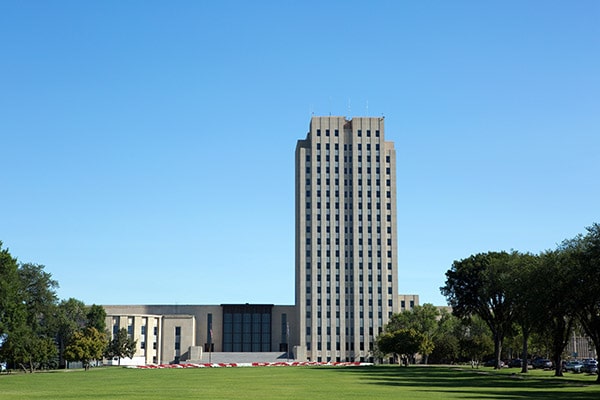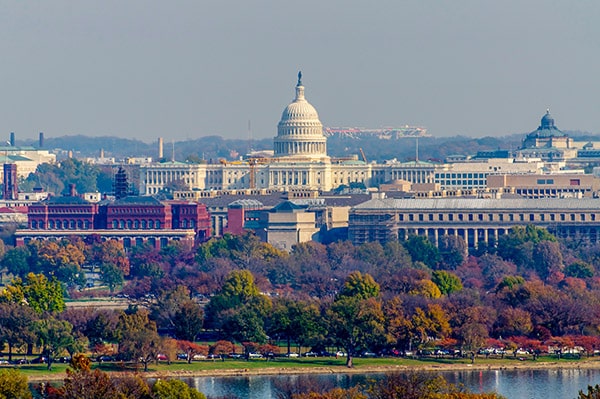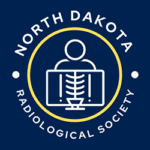Federal & State Legislative Advocacy
North Dakota State Representation
North Dakota Assembly home page
Legislators by district (including photos)
The House and Senate are in session for only 80 days in odd-numbered years.
Governor Doug Burgum signed legislation with new state legislative maps as of November 20, 2021, for 47 legislative districts.

The North Dakota Legislative Assembly is the North Dakota state legislature, in the Bismarck state capitol building. The Legislative Assembly consists of two bodies, the North Dakota House of Representatives and the North Dakota State Senate. Our representatives and Senators are assisted in daily activities by a legislative council.
Federal Representation for North Dakota
US House of Representatives:
Kelly Armstrong (R)
US Senate:
Kevin Cramer (R), John Hoeven (R)

Current issues of ACR active involvement
Medicare Physician Fee Schedule (MFPS) Proposed Rule
The ACR submitted comments to CMS on September 8, 2023, addressing Radiologist specific issues and making recommendations regarding the Medicare Physician Fee Schedule (MFPS) proposed rule:
https://www.acr.org/-/media/ACR/Files/Advocacy/AIA/091323-ACR-24-MPFS-PR-Comment-Letter-Final.pdf
Currently proposed changes to both RVUs and end of moratorium on the Office/Outpatient E/M add-on complexity codes (G2211) would result in reimbursement decreases: Radiology 3%, IR 4%, Nuclear Medicine 3%, Radiation Oncology & Radiation Therapy 2%. However, as congress passed a 2.5% 2023, 1.25% 2024 Consolidated Appropriations Act which will increase overall loss 1-2% for each of the specialties.
ACR and Merit based Incentive Payment System (MIPS)
The Physician-Focused Payment Model Technical Advisory Committee (PTAC) released a request for information to better understand specialty medicine integration into current Alternate Payment Models (APMs). PTAC, an independent advisory committe who makes recommendations to Department of Health and Human Services, wanted details regarding specialist impact by current population-based reimbursement system. The models currently in use are referred to as Population-Based Total Cost of Care (PB-TCOC). Under the current Merit based Incentive Payment System (MIPS) & APMs, Radiologists have limited ability to receive maximum incentive adjustments, despite perfect performance.
PTAC request for information:
ACR response, August 1, 2023. This proposes possible physician-focused Radiology payment models could focus on Actionable Incidental Findings (AIFs), breast, AAA, lung and colorectal cancer screening and cancer staging and follow-up, either isolated or integrated into multispecialty models.
https://www.acr.org/-/media/ACR/Files/Advocacy/AIA/PTAC-RFI--ACR-Comment-Letter-2023.pdf
ACR, others request CMS consider separate Nuclear Medicine agent reimbursement
September 11, 2023 letter authored by the ACR and three other groups requests CMS to separately pay for diagnostic radiopharmaceuticals which exceed a specified threshold, to ensure patient access to the most medically appropriate treatment plans.
The letter was in response to CMS' solicitiation for comments issued July 13 on potentially issuing separate payment for diagnostic radiopharmaceuticals, as part of the 2024 Hospital Outpatient Prospective Payment System (HOPPS) proposed rule. Medicare currently reimburses for radiopharmaceuticals through a packaged system, regardless of product cost.
The Medicare Access to Radiology Care Act (MARCA — H.R. 3657 /S. 2641 ).
MARCA was Introduced by US Representative Mike Boyle (D-PA). If passed by Congress, this law would allow CMS to reimburse work performed by Registered Radiologist Assistants (RRAs), under the supervision of Radiologists. This bill is not without controversy amongst Radiologists in the ACR. The ACR currently takes a neutral stance. Currently, this has minimal congressional support, the ACR has not met with congress, RADPAC has not held or attended fundraisers, and there are few congressional cosponsors.
“Surprise” Billing and “No Surprises” Act Implementation
No Surprises Billing Act interim final rule, enacted on December 28, 2021 as part of the Consolidated Appropriations Act (CAA) of 2021. This was intended to protect patients from unanticipated out of network bills, but instead protects insurance companies from bills received for provided emergent care. North Dakota operates under collaborative agreement, has a ND External Review Process for Adverse Determinations and dispute resolution at the Federal level.
No Surprises Billing Act interim final rule, enacted on December 28, 2021 as part of the Consolidated Appropriations Act (CAA) of 2021. This was intended to protect patients from unanticipated out of network bills, but instead protects insurance companies from bills received for provided emergent care. North Dakota operates under collaborative agreement, has a ND External Review Process for Adverse Determinations and dispute resolution at the Federal level.
The American College of Radiology (ACR, American College of Emergency Physicians (ACEP) and the American Society of Anesthesiologists (ASA) believe that the arbitration process is murky, and favors insurance companies. The Independent Dispute Process (IDR) is at the core of the complaint for the interim version of the bill.
IDR process from the insurance perspective
U.S. District Court for the Eastern District of Texas Aug. 3, 2023 decision against the federal government’s implementation of the No Surprises Act (NSA). The court ruled in a suit brought by the Texas Medical Association, Texas Radiological Society, Houston Radiology Associated and others (“TMA IV”) that the government’s “fee increase and batching rule” implementing the NSA violated federal law.
How Does North Dakota ACR participate in Advocacy?
The North Dakota ACR has been considered dormant for many years. We now have a Councilor, Alternate Councilor and YPAC representative Councilor. If you have a specific issue you would like addressed. consider contacting them through our website.
How can I become involved in advocacy?
If you have specific concerns, let's work together to achieve greater results.
2023, Legislation not actively in session.
Bills Currently in Draft Status
When you join both ACR and NDMA, we gather strength in numbers. Testimony is more compelling when we say " we represent this percentage of the physicians or Radiologists in the state." Testimony from physicians in the state can be very persuasive for the legislators. If you want a voice and a seat at the table when decisions are made, your membership is a key component of having a say.
Leading this effort is Dr. Martin-Macintosh. Please contact her with suggestions and ideas.
State Issues and Bill Tracking
https://www.ndmed.org/
North Dakota Health Care Statistics:
